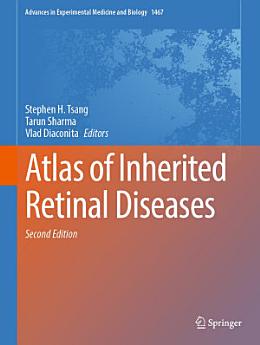Atlas of Inherited Retinal Diseases: Edition 2
About this ebook
In this thoroughly updated new edition featuring new images and the latest research developments, new chapters on the history taking of IRD suspect patients. Updated chapters on mimics of IRD diseases, as well as a novel section on current available treatments.
About the author
Stephen H. Tsang MD, PhD has been culturing embryonic stem (ES) cells since 1992 and in 1995 created the first mouse model for a recessive form of retinitis pigmentosa (RP) by applying homologous recombination to ES cell technology. Since 1996, the Dr. Tsang has been quantifying retinal function and structure in gene-targeted mutant mice. As the director an international referral center for inherited retinal degenerations, Dr. Tsang cares for a specific subgroup of patients that are most appropriately aligned with precision medicine. At times, patients suffer from a disorder that is related to an existing transgenic mouse model generated in the laboratory, and other times patients inspire new models. . Dr. Tsang's contributions to genetics has being recognized by the 2005 “Bernard Becker-Association of University Professor in Ophthalmology”-“Research to Prevent Blindness” Award, Carl Camras Award, and the 2013 Bradley Straatsma Lectureship. Dr. Tsang received 2008 resident teaching award. He is also a standing member of the “DPVS” study section at NIH, American Society for Clinical Investigation, American Ophthalmological Society and Macular Society.
Tarun Sharma
Tarun Sharma, MD, FRCSEd, MBA, FASRS, is an Associate Professor of Ophthalmology at Columbia University Irving Medical Center, which is connected to NewYork-Presbyterian and Harlem Hospital. Prior to joining Columbia in 2017, Dr. Sharma was a professor of ophthalmology, director of vitreoretinal service, and program director of the retina fellowship at Sankara Nethralaya, Chennai, India. The American Academy of Ophthalmology honored him with three awards: the Achievement Award (2007), the International Ophthalmologist Education Award (2009), and the International Scholar Award (2011).
Likewise, the American Society of Retinal Specialists (ASRS) awarded him the designation of “Fellow” (2022) in appreciation of his dedication, expertise, and leadership within the field of medical and surgical retina. Throughout his career, Dr. Sharma has been dedicated to education and training. He mentored over 100 retina fellows who now practice worldwide. He received the John Martin Wheeler Memorial Teaching Award from the Edward S. Harkness Eye Institute, Columbia Ophthalmology, twice (2022 and 2024) for his outstanding dedication and contribution to resident education and ophthalmology.
Vlad Diaconita
Vlad Diaconita is a Romanian-born, Canadian-raised retina specialist who joined Columbia University in 2019. He now holds a faculty position in the Department of Ophthalmology at Columbia University. Dr. Diaconita has a passion for teaching residents and fellows, including on advances on retina surgery. He has research interests in ophthalmic imaging, artificial intelligence applications in medicine as well as medical education. He has been recognized with awards and grants as a medical educator, researcher and has been a panelist and speaker at national and international conferences. He is an active member of the American Academy of Ophthalmology, American Society of Retinal Surgeons, Canadian Ophthalmology Society, Canadian Retina Society, European Retina Society, VitBuckle Society as well as other national and international groups.





